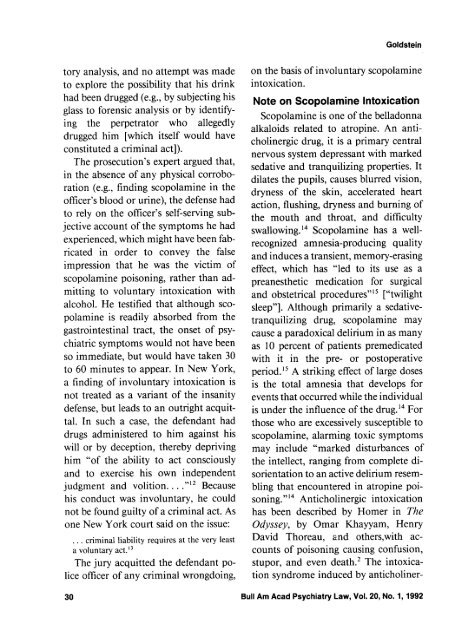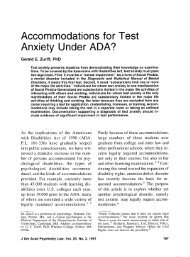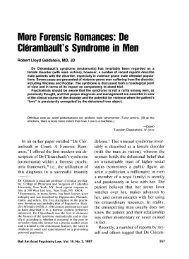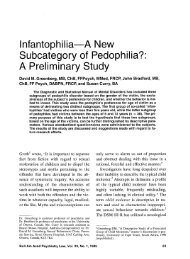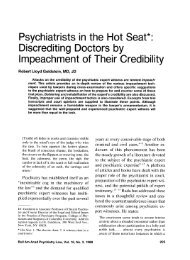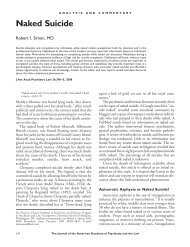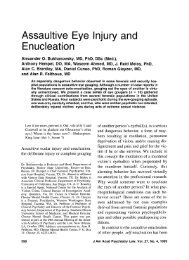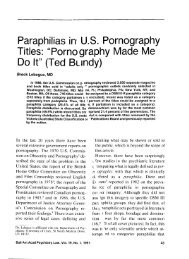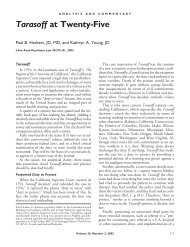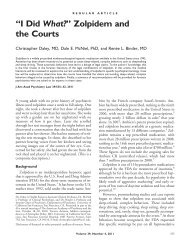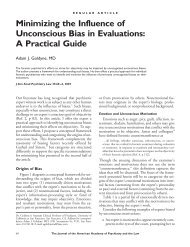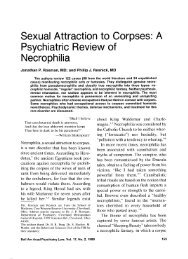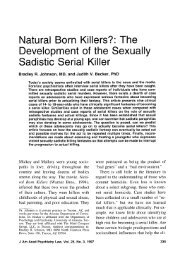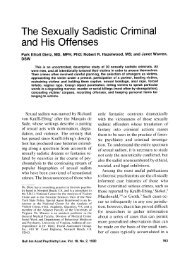involuntary Intoxication and Insanity
involuntary Intoxication and Insanity
involuntary Intoxication and Insanity
You also want an ePaper? Increase the reach of your titles
YUMPU automatically turns print PDFs into web optimized ePapers that Google loves.
tory analysis, <strong>and</strong> no attempt was made<br />
to explore the possibility that his drink<br />
had been drugged (e.g., by subjecting his<br />
glass to forensic analysis or by identify-<br />
ing the perpetrator who allegedly<br />
drugged him [which itself would have<br />
constituted a criminal act]).<br />
The prosecution's expert argued that,<br />
in the absence of any physical corrobo-<br />
ration (e.g., finding scopolamine in the<br />
officer's blood or urine), the defense had<br />
to rely on the officer's self-serving sub-<br />
jective account of the symptoms he had<br />
experienced, which might have been fab-<br />
ricated in order to convey the false<br />
impression that he was the victim of<br />
scopolamine poisoning, rather than ad-<br />
mitting to voluntary intoxication with<br />
alcohol. He testified that although sco-<br />
polamine is readily absorbed from the<br />
gastrointestinal tract, the onset of psy-<br />
chiatric symptoms would not have been<br />
so immediate, but would have taken 30<br />
to 60 minutes to appear. In New York,<br />
a finding of <strong>involuntary</strong> intoxication is<br />
not treated as a variant of the insanity<br />
defense, but leads to an outright acquit-<br />
tal. In such a case, the defendant had<br />
drugs administered to him against his<br />
will or by deception, thereby depriving<br />
him "of the ability to act consciously<br />
<strong>and</strong> to exercise his own independent<br />
judgment <strong>and</strong> volition. . . ."I2 Because<br />
his conduct was <strong>involuntary</strong>, he could<br />
not be found guilty of a criminal act. As<br />
one New York court said on the issue:<br />
. . . criminal liability requires at the very least<br />
a voluntary act.13<br />
The jury acquitted the defendant po-<br />
lice officer of any criminal wrongdoing,<br />
30<br />
Goldstein<br />
on the basis of <strong>involuntary</strong> scopolamine<br />
intoxication.<br />
Note on Scopolamine <strong>Intoxication</strong><br />
Scopolamine is one of the belladonna<br />
alkaloids related to atropine. An anticholinergic<br />
drug, it is a primary central<br />
nervous system depressant with marked<br />
sedative <strong>and</strong> tranquilizing properties. It<br />
dilates the pupils, causes blurred vision,<br />
dryness of the skin, accelerated heart<br />
action, flushing, dryness <strong>and</strong> burning of<br />
the mouth <strong>and</strong> throat, <strong>and</strong> difficulty<br />
~wallowing.'~ Scopolamine has a wellrecognized<br />
amnesia-producing quality<br />
<strong>and</strong> induces a transient, memory-erasing<br />
effect, which has "led to its use as a<br />
preanesthetic medication for surgical<br />
<strong>and</strong> obstetrical procedure^"'^ ["twilight<br />
sleep"]. Although primarily a sedativetranquilizing<br />
drug, scopolamine may<br />
cause a paradoxical delirium in as many<br />
as 10 percent of patients premedicated<br />
with it in the pre- or postoperative<br />
period.I5 A striking effect of large doses<br />
is the total amnesia that develops for<br />
events that occurred while the individual<br />
is under the influence of the drug.14 For<br />
those who are excessively susceptible to<br />
scopolamine, alarming toxic symptoms<br />
may include "marked disturbances of<br />
the intellect, ranging from complete disorientation<br />
to an active delirium resembling<br />
that encountered in atropine poisoning."14<br />
Anticholinergic intoxication<br />
has been described by Homer in The<br />
Odyssey, by Omar Khayyam, Henry<br />
David Thoreau, <strong>and</strong> others,with accounts<br />
of poisoning causing confusion,<br />
stupor, <strong>and</strong> even death.2 The intoxication<br />
syndrome induced by anticholiner-<br />
Bull Am Acad Psychiatry Law, Vol. 20, No. 1, 1992


